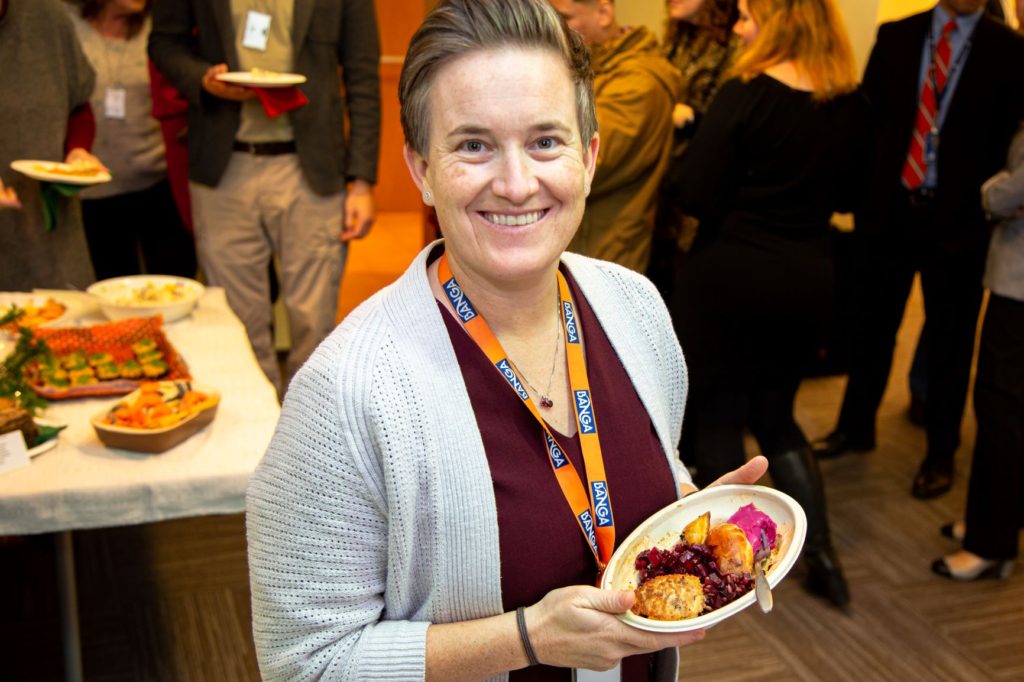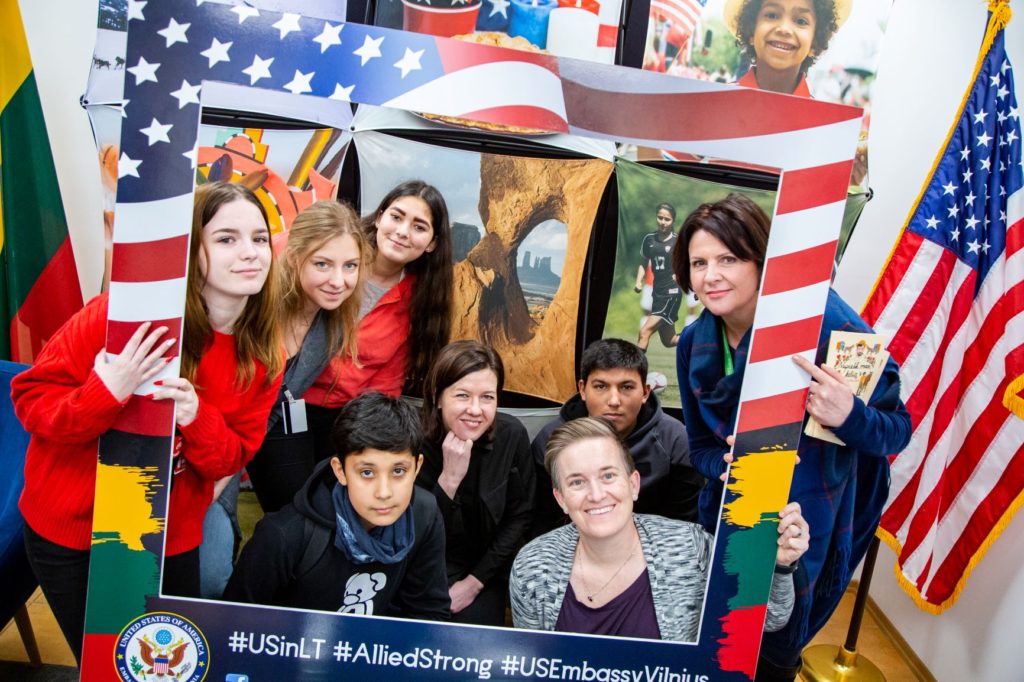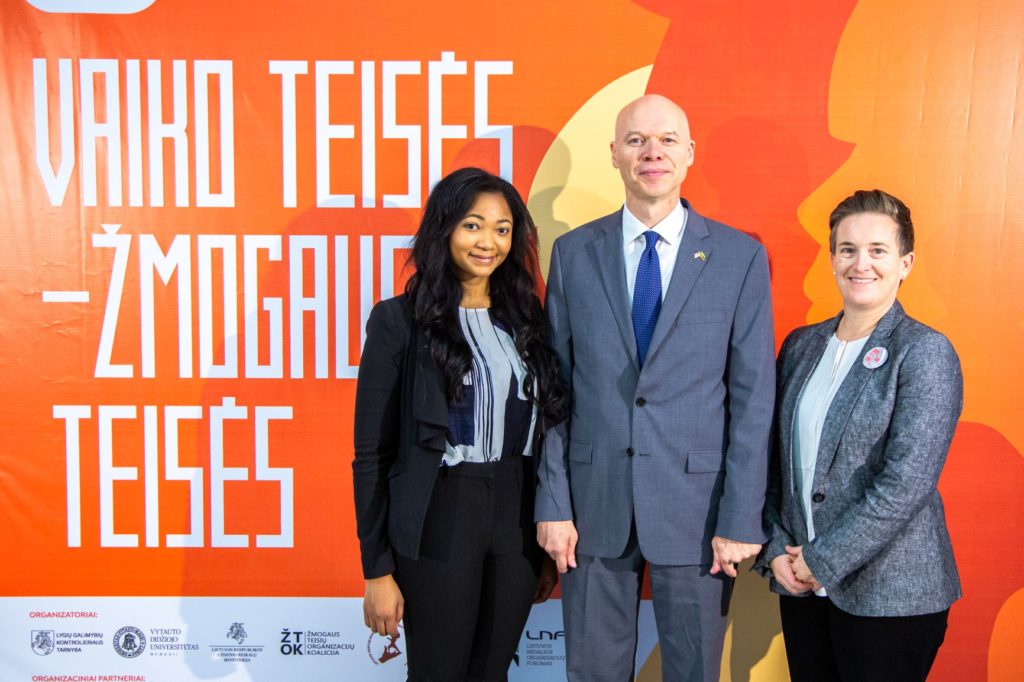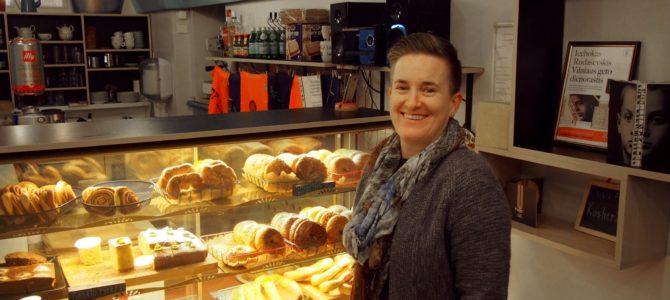Just before quarantine was announced the Bagel Shop received an important visitor. The interview done several months ago remains just as important and perhaps even more so now. We spoke about the importance of ethnic food to Jews living in Lithuania and about a people’s right to have ethnic foods. We await the re-opening of the Bagel Shop Café with bated breath and hope to continue this conversation in front of an audience.
Bagel Shop Interview with Meghan Luckett, Cultural Attaché at the US embassy in Vilnius
Interview by Dovile Rūkaitė, LJC project manager.
Do you like bagels? What’s your favorite kind?
Yes, of course we love bagels. My favorite are everything bagels, we buy them at your bagel shop and in the market and eat them almost every week. We make bagel sandwiches with baked egg, spices and all kinds of stuff. One of our colleagues is a great cook, she makes us homemade bagels. Once we brought her some from Trader Joe’s and she made us excellent everything bagels. My wife is a great cook, she bakes sometimes, but we usually buy them because they are very good.
Could you say something about bagel culture? Its roots are here but it thrives in the US.
I am from Tucson, Arizona, which is in the southwest part of the country. There is actually very big Jewish community. I grew up with several Jewish families. I went to bar mitzvas, bat mitzvas. I spend a lot of time at the Jewish Community Center and we always eat bagels with cream cheese, salmon or lox, all those things. We have lots of bagel shops in the US. They are in chains like Einstein’s, Brueger’s. But I grew up knowing that bagels are part of Jewish culture. New York, New Jersey are always competing in who makes bagels better.
Have you ever thought about the right to ethnic food? We declare it is the same kind of right as human rights. Do Jews have the right to fight for their ethnic foods?
I think culture is part of human rights, whether it is a name or a language, an alphabet or food. That is part of tradition and culture and it is really important to respect these things and to honor where they come from. The Bagel Shop magazine which the US embassy sponsored in the past becomes very important, and what’s nice about food is that it is a way to share your culture and teach people about your culture in a more easier way to understand. When there are issues of anti-Semitism, xenophobia or anything like that, whether it is Jewish culture or another, food is really a nice way to make those connections. It is really important that people hang on to those traditions especially in the US. You know, for years America was a melting pot where everyone used to come and assimilate, because they felt like they had to leave their cultures behind in order to become American. But if you do that, you lose your culture, you lose your traditions, your language, your foods. And we have a lot of Americans whose parents were first- or second-generation immigrants and they do not speak their language. Their parents were afraid to teach them their language and were afraid they will never fit in. Lithuanians are very different, which is wonderful. I think they established all the Saturday schools and all kind of establishments so their kids would never forget their heritage or their language. And if you look at Jewish culture in the US, I think food is a very big part of that. So I would say it is very important to respect people’s culture and traditions and let them maintain these, so they can come together and don’t have to lose their culture in order to fit in. I think in the last couple of decades it has begun to shift. Instead of the melting pot, maybe now we can call it a salad; no need to lose your own culture and traditions to assimilate. You bring them and add it all together and mix it up. Good salad had lots of different ingredients. Thanksgiving in the US suddenly became really important because people are bringing in other traditions. When Lithuanian families mix with Indian or Mexican families, put their mix of different food on the table and they are nor mushed together, but displayed separately, for people to appreciate that.
How long will you be in Lithuania? What is your personal connection, besides your job?
In a back of my head I always knew my mother’s side of the family came from Eastern Europe. Sometimes the census data say Russia, sometimes Poland, but when I went there and started to research, I found out it was from Liubavas, which is near Kalvarija in Lithuania. So I realized it make sense that sometimes they put Russia, sometimes Poland, because her family left in the late 1800s when it switched back to Tsarist Russia, but before that it was part of the Grand Duchy. I have just spent some time at the national archives in Vilnius and learned a little bit more about my third great grandfather. I think what happened is that one of his cousins left Lithuania in 1850 and went to Cincinnati, Ohio, and then maybe 15 years later called them over. The reason that this cousin left is, once a Russian soldier came into his house and talked badly about his mother and he punched the Russian soldier so hard the he had to leave for England, and eventually made his way to Ohio. Later he started to call his family over from Lithuania. On that side the name is Isacs. Their previous names were Shakna Wortelsky or Wortolsky, who were turned into Izaks in the US. So my Litvak side of the family is from my mom’s side. My grandfather married a Presbyterian. So my grandmother was Presbyterian and the Litvak line stopped with my mother. I knew no Lithuanian words. I think they spoke Yiddish. My mom remembers my grandma’s English with an accent but was not sure what kind.

Photo: Vytas Neviera
What about cooking in your kitchen?
I would love to say that I grew up with some Jewish tradition or religion but I didn’t, because my grandpa married a Presbyterian and they followed the Presbyterian side. They became pretty secular but my mom’s cousin kept all Jewish traditions, they spoke Hebrew, went to Israel. They did very different things than we did. My mom talks about matzah ball soup. But we never had anything like that.
What are your professional goals in Lithuania and what have the results been so far?
I have been here for over 20 months. I came in the summer of 2018. I spent 8 month in the US learning the Lithuanian language, or at least trying to learn it, because it is very old and difficult. The reason I got this job is, before when I was working in Nigeria, I received a list of countries which I had to rank as preferences for my next position. I ranked Lithuania very highly. Because I came from a hardship post like Nigeria, I got my first choice, Lithuania. Hardship means it’s harder to live there, there are more restrictions, more security issues, a more challenging environment. Lithuania is like living in the US. You know where you are there are lots of amenities, lots of things to do, it is safe. So they gave me the job. I work in the public affairs section and have an opportunity to work with Lithuanians, to share American culture and talk about the connections between Lithuania and the US. You know we have long history of friendship and cooperation. We work together accomplishing goals of democracy and human rights. I get to travel all over the country, talk to students, talk to different groups about the things we do in US and about the things we do in Lithuania.
When I first got here I would say it was very different from West Africa, from where I arrived. In Africa everyone talks to you everywhere. If you pass someone, you’ll ask, how are you, how was your night, how is your family–lots of greetings. But not necessarily anything after that. You meet people and move on. In Lithuania there are not greetings, but once you have become friends with someone, it is a much deeper friendship. It takes more time to get there but once people warm up it is very nice!

Photo: Vytas Neviera
What can you say about the young people in Lithuania?
I have visited over 40 out of 60 municipalities in Lithuania. I am collecting “Surink Lietuvą” (Collect Lithuania) magnets and I am very close to having them all. I am very impressed with the young people in Lithuania, they are very smart, they are very driven. They ask good questions and they are very focused on developing Lithuania and creating opportunities for themselves. We were just in Kaunas at a school meeting a group of students and I asked what the biggest issues in Lithuania they are facing are. So they said they wanted more economic opportunities and they wanted to stay in Lithuania. People say that a lot of young people leave, but I see most of them want be here, they just need more opportunities and reasons to stay here. If you are from Kaunas you most likely won’t move to Pagėgiai or Rokiškis for a job, you most likely want a bigger city. So unfortunately only in the bigger cities are there more opportunities, but you have to create those opportunities or work with the government and civil society. They always ask: is America like in the movies and TV shows? Sometimes I say sometimes yes, sometimes no. The US is so big, it is so different, the East Coast, the West Coast. A lot of them are interested in studying or visiting.
Lithuania and its people: how far are we along in the terms of your vision of democratic society?
I think Lithuania seems to be pretty engaged in vibrant democracy.
People have told me there is low voter turnout, lots of apathy. If you compare the last numbers, it was 60 to 70 percent, so it was higher. Young people are interested in politics, they ask a lot of questions. The EU and US are a bit similar, the US has a big federal system of government and then the state system. I am impressed how people seem to be engaged and are growing really fast. One thing that the US embassy really cares about is civil society: NGOs, volunteering, civil engagement at a younger age. New things are happening in the schools, students are engaged in the extra hours required to do volunteering, which helps move that spirit forward. There is more access to entrepreneurship, more movement towards teaching people how to get involved. This is all growing. The more people you engage, the better society becomes in all respects.
Maybe opportunities to get involved need time to be developed in the smaller cities. People still don’t know how to get involved and organizations need time to figure out the way and get funding. The difference between Vilnius and other parts of the country is still pretty striking.
Getting this out to the regions is happening but is still slow, and civil society can help direct the government to put more resources into developing the regions.
The Jewish community in Lithuania has a glorious history, a dramatic period, and today the community fights for its voice to be heard. It is so different from the US. What do you think about ways to empower or support initiatives such as the Bagel Shop tolerance campaign and similar efforts? What is your message for young Jewish activists?
Talking about history can be very painful but is really important. One thing that we try to do with US history is that we do talk about all of this. We do presentations on American history the way Native Americans were treated, we talk about slavery, issues we still have today such as racism, gender disparities, people with disabilities and the situations they face. It is important to talk about history because when you confront it yourself, you can stop anybody from saying “it never happened,” or change the way it happened, or question what had happened. It is important for people to understand history. One of the things which is really forgotten most of the time when the issue of the Holocaust comes up is that before 1941 Jews and Lithuanians were living interconnected for hundreds of years. Lithuania would never have become the Jerusalem of Lithuania had it not been a safe and tolerant place. Jews thorough history have been persecuted in many different places. If there is a way to bring the focus to a time when people lived really harmoniously… and when we talk about Holocaust we forget about the horrible [Soviet] deportations, but we do not have to compare these things. I think there are people who do and this maintains one problem at a higher level than another, and it prevents people joining in solidarity. What would be very interesting is if the people who make “Mission Siberia” would address Jewish history matters, because both groups suffered greatly. It happens often around the world, two minority groups are pitted against each other, they are fighting each other instead of fighting for change. It happens because people, instead of joining together for similar causes such as Jewish rights, LGBT rights, disabled rights, Roma rights, any of those vulnerable groups’ rights, they all fight for the same old things. Things might look different if all the groups could come together, it would make it easier. The bottom line is, you want to be visible.

Photo: Vytas Neviera


